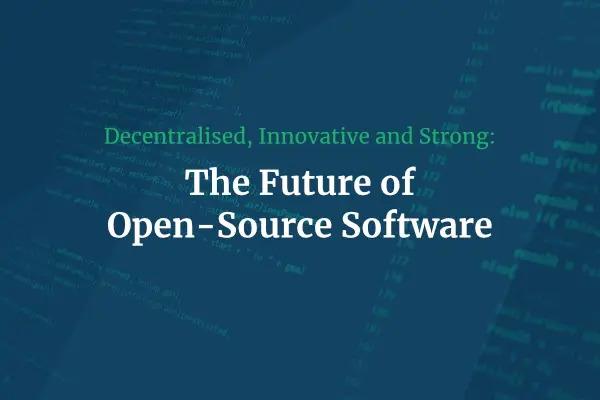Decentralised, Innovative and Strong: The Future of Open-Source Software

Open-source software has evolved dramatically from its early days in small developer circles — it now plays a major role behind innovation across industries such as artificial intelligence (AI), healthcare, finance, and journalism. Many media organisations have already changed expensive proprietary tools for open, collaborative platforms that give them more control, flexibility, and long-term value. In this article, we'll take a look at trends driving open-source innovation.
Open Source Artificial Intelligence
AI has become one of the most important trends in technology, and with it, open-source AI is gaining a significant role. For years, the AI landscape was dominated by a few tech giants. Today, models like GPT-2 and Grok are disrupting that status quo, proving it's possible to reach similar capabilities without massive compute power or high costs.
This shift is transforming how businesses and developers approach AI integration. Companies can now build their own models at lower costs without relying on expensive APIs to bridge old systems with next software. Developers gain more freedom to experiment and customise, which can lead to greater innovation.
Like the technology itself, the definition of open source AI is relatively new, and refers to artificial intelligence systems that are made available in a way that allows anyone to use them freely. This includes the freedom to study how the system works, explore its components, and make changes as needed. People can also share the system with others, whether they’ve modified it or not. These principles apply not only to the complete system but also to its individual parts, such as models, weights, and parameters.
Open Source Security Improvements
Security has always been a primary concern in software development. But with the increasing use of open-source tools across various industries, it's becoming more critical. This year, we can expect a focus on security within the open-source ecosystem, supported by new tools and best practices designed to track open source software inventory and identify possible security threats.
Best practices go beyond fixing known vulnerabilities; they involve building secure-by-design systems through preventive measures such as dependency tracking, artifact signing, and using vulnerability scanning tools. It’s not just about shielding code — it’s about maintaining customer trust, business continuity, and company reputation in an increasingly complex software supply chain.
New Funding Models for Open Source Sustainability
Sustainability is becoming a pressing matter in the open-source ecosystem. As more companies and individuals contribute to open-source projects, there’s a growing realisation that open-source communities need to be sustainable not just in terms of code but also in terms of community, governance, and funding.
Despite global reliance on community-driven open-source software, there is no single funding model to support these efforts. This gap creates increasing risks to the long-term stability of the open-source software ecosystem. In 2024, several innovative experiments and pilot programs were launched, any of which could evolve into lasting solutions. These include direct monetisation approaches, such as premium consultancy services and enterprise-level funding for open-source projects. Corporate-led initiatives – such as GitHub Sponsors and the Open Source Pledge – have seen growing participation, with thousands of organisations now contributing funds directly to maintainers. Meanwhile, public sector interventions, such as Germany’s Sovereign Tech Fund and the US Open Technology Fund, are pioneering the use of government funding for essential digital infrastructure. While no single solution will suit every project, these efforts collectively represent important progress towards a more resilient open-source future.
Given that, we can expect to see the rise of ethical open-source projects that prioritise long-term sustainability. This will include better financial models to support open-source maintainers, ethical considerations in coding practices, and ethical open source licenses for developers to control how their software is used.
Decentralisation
Decentralised finance has already made a global impact, and decentralised development models will soon follow. As blockchain technology advances, these platforms will allow developers to build and deploy software in a distributed way, powering financial applications that operate without centralised authorities.
In this new landscape, open source isn’t just about code - it’s about trust, access, and sustainability. With stronger security, decentralised platforms, and innovative funding mechanisms, open-source software is becoming a critical part of next-generation technological innovation.
Contact us to learn more about our open source products. Subscribe to our newsletter to stay informed about industry trends and innovations.
